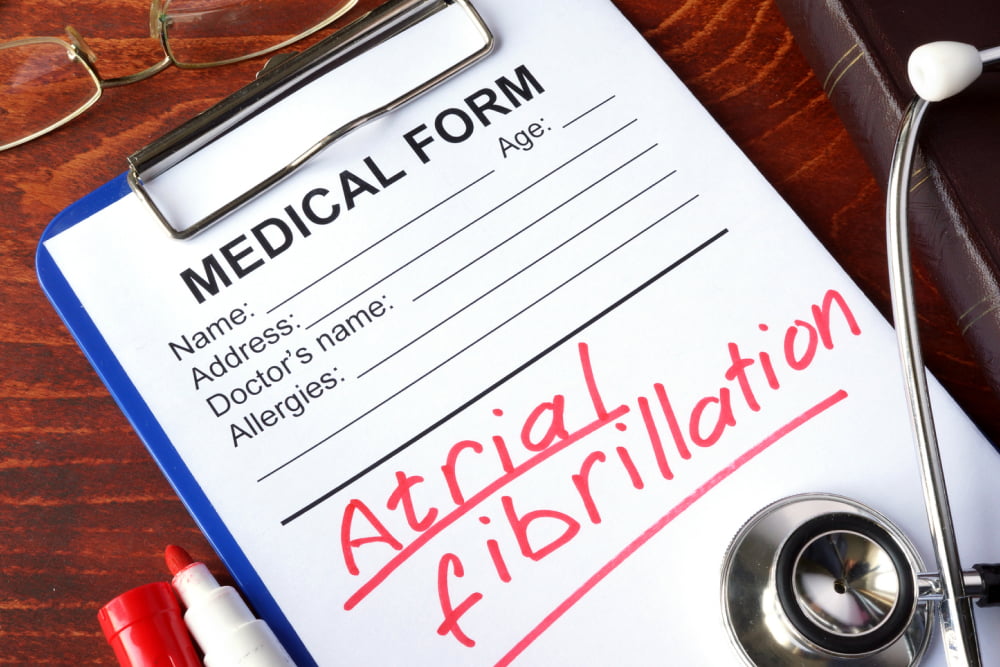
8 warning signs of atrial fibrillation
Atrial fibrillation, usually abbreviated as AFib, is a heart rhythm disorder. It occurs when the heart’s upper chambers (called the atria) beat irregularly and out of sync with its lower chambers (the ventricles). While some with the condition may not experience symptoms, others may notice some warning signs. Recognizing these symptoms is crucial because untreated AFib can lead to numerous health complications, like stroke and heart failure. Here are some warning signs for AFib.
Palpitations
One of the most common symptoms of atrial fibrillation is palpitations. Palpitations are a sensation of rapid, irregular, or fluttering heartbeat. People with AFib often describe it as feeling like their heart is racing or pounding in their chest. Palpitations can be occasional or persistent and may last a few seconds or several hours. If one experiences them, it’s essential to consult a healthcare professional for a thorough evaluation because they can be signs of an underlying heart issue, including AFib.
Fatigue and weakness
Feeling excessively tired or weak is another warning sign of AFib. When the heart isn’t pumping blood effectively due to irregular atrial contractions, the body may not receive an adequate supply of oxygen and nutrients. This can lead to persistent fatigue and weakness, making it hard to complete simple daily tasks. If someone finds themselves unusually tired despite getting enough rest, it’s essential to consider the possibility of AFib and seek expert advice.
Shortness of breath
Atrial fibrillation often causes shortness of breath, especially during physical activity or exertion. An irregular heartbeat can lead to inefficient blood circulation, which may result in insufficient oxygen delivery to the body’s tissues. Consequently, someone with these problems may struggle to catch their breath or feel breathless with minimal effort. If this symptom occurs frequently or becomes more pronounced, it should not be ignored, as it could point toward AFib. When individuals feel that their breathing has become shallow, they can consult a local healthcare expert for solutions.
Dizziness and lightheadedness
Dizziness and lightheadedness are among the most alarming warning signs of the disorder. Irregular heart rhythms can disrupt the normal blood flow to the brain, causing a drop in blood pressure. As a result, patients may experience episodes of dizziness or feel lightheaded, potentially leading to fainting or near-fainting spells. These symptoms may be more noticeable when one changes positions, such as standing up quickly. If a person frequently feels dizzy or lightheaded, consulting a healthcare professional for a thorough evaluation is the right course of action.
Chest pain or discomfort
While chest pain is not as common in AFib as in some other heart conditions, patients may experience chest discomfort in certain situations. This can manifest as a tightness, pressure, or aching sensation. It’s essential to remember that chest pain can have various causes and is not always indicative of AFib. However, if someone experiences chest discomfort with other AFib symptoms, seeking attention is advisable to rule out any severe cardiac issues.
Fluttering or “thumping” sensation
Some people with AFib describe a fluttering or “thumping” sensation in their chest. This sensation can be disconcerting and is often accompanied by palpitations. It’s important to note that these irregular sensations indicate something amiss with a person’s heart rhythm. If people notice this symptom, they shouldn’t hesitate to consult a healthcare provider for further evaluation. A healthcare expert will not only diagnose the underlying causes of the thumping but also offer solutions for people to deal with the problem as soon as possible.
Cognitive impairment
A person’s heart rhythm can occasionally affect their cognitive functionality. Therefore, cognitive impairment is a lesser-known but equally important symptom of AFib. The condition can reduce blood flow to the brain, leading to difficulties in concentration, memory lapses, and mental fogginess. These cognitive changes may be subtle and easily attributed to stress or fatigue, but they can significantly impact a person’s daily life and overall well-being. If a person notices cognitive decline alongside other AFib symptoms, addressing it with a healthcare professional is crucial.
Reduced ability to exercise
As implied earlier, the blood is the primary nutrient carrier of the body. When people suffer from AFib, their blood pumps irregularly throughout their blood vessels. Consequently, essential nutrients do not reach all zones within the body, including critical organs like the lungs, kidneys, and brain. As a result, people with this health condition feel demotivated to do the simplest tasks, such as climbing a flight of stairs or skipping a few times. They also feel uninterested in following daily workout routines beneficial for health. A reduced ability to exercise is somewhat related to fatigue as it directly results in a loss of motivation to work out.
To conclude, AFib is a serious heart condition requiring prompt attention. Recognizing the warning symptoms is the first step toward early detection and effective management. Palpitations, fatigue, weakness, shortness of breath, dizziness, chest discomfort, fluttering sensations, and cognitive impairment are all potential signs. If somebody or their loved ones experience these symptoms, consulting a healthcare provider is essential for a thorough evaluation and appropriate treatment.
Early diagnosis and management of AFib can help reduce the risk of complications, including stroke and heart failure. Treatment may include options to control heart rhythm and prevent blood clots, lifestyle modifications, and, in some cases, procedures such as cardioversion or ablation. By listening to one’s heart and taking any warning signs seriously, one can take control of their health and improve their quality of life while reducing the risks associated with AFib. While AFib is a severe condition, it can be managed well in the long term with the right advice and guidance, so individuals should not hesitate to speak to a healthcare professional.


